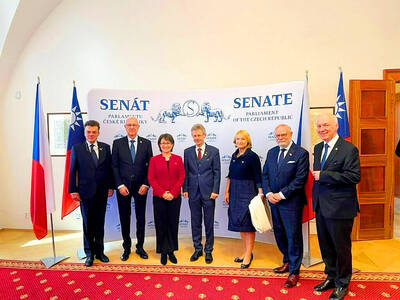France might announce extra action to fight overspending in the coming months, a top official said yesterday against a background of unease on financial markets over debt in the eurozone.
At the beginning of this month, the center-right government announced that it intended to find 100 billion euros (US$124 billion) in the next three years, achieving half of this by cutting spending and half with new revenues.
Claude Gueant, the secretary general at the presidential palace, told the Financial Times newspaper that extra action might be announced by the autumn to ensure that the public deficit was reduced to 3 percent of GDP by the end of 2013, as promised to EU authorities, from a forecast level of 8 percent this year.
France has been largely unscathed so far by market pressures over overspending, but has announced strong action to correct its finances, as have many other European governments.
“There will be other announcements. We have to do more of course — a lot more,” Gueant said.
The government was preparing a budget for next year and a three-year spending plan which would “appear serious and determined,” he said.

FREEDOM OF NAVIGATION: The UK would continue to reinforce ties with Taiwan ‘in a wide range of areas’ as a part of a ‘strong unofficial relationship,’ a paper said The UK plans to conduct more freedom of navigation operations in the Taiwan Strait and the South China Sea, British Secretary of State for Foreign, Commonwealth and Development Affairs David Lammy told the British House of Commons on Tuesday. British Member of Parliament Desmond Swayne said that the Royal Navy’s HMS Spey had passed through the Taiwan Strait “in pursuit of vital international freedom of navigation in the South China Sea.” Swayne asked Lammy whether he agreed that it was “proper and lawful” to do so, and if the UK would continue to carry out similar operations. Lammy replied “yes” to both questions. The

Two US House of Representatives committees yesterday condemned China’s attempt to orchestrate a crash involving Vice President Hsiao Bi-khim’s (蕭美琴) car when she visited the Czech Republic last year as vice president-elect. Czech local media in March last year reported that a Chinese diplomat had run a red light while following Hsiao’s car from the airport, and Czech intelligence last week told local media that Chinese diplomats and agents had also planned to stage a demonstrative car collision. Hsiao on Saturday shared a Reuters news report on the incident through her account on social media platform X and wrote: “I

SHIFT PRIORITIES: The US should first help Taiwan respond to actions China is already taking, instead of focusing too heavily on deterring a large-scale invasion, an expert said US Air Force leaders on Thursday voiced concerns about the Chinese People’s Liberation Army’s (PLA) missile capabilities and its development of a “kill web,” and said that the US Department of Defense’s budget request for next year prioritizes bolstering defenses in the Indo-Pacific region due to the increasing threat posed by China. US experts said that a full-scale Chinese invasion of Taiwan is risky and unlikely, with Beijing more likely to pursue coercive tactics such as political warfare or blockades to achieve its goals. Senior air force and US Space Force leaders, including US Secretary of the Air Force Troy Meink and

Czech officials have confirmed that Chinese agents surveilled Vice President Hsiao Bi-khim (蕭美琴) during her visit to Prague in March 2024 and planned a collision with her car as part of an “unprecedented” provocation by Beijing in Europe. Czech Military Intelligence learned that their Chinese counterparts attempted to create conditions to carry out a demonstrative incident involving Hsiao, which “did not go beyond the preparation stage,” agency director Petr Bartovsky told Czech Radio in a report yesterday. In addition, a Chinese diplomat ran a red light to maintain surveillance of the Taiwanese